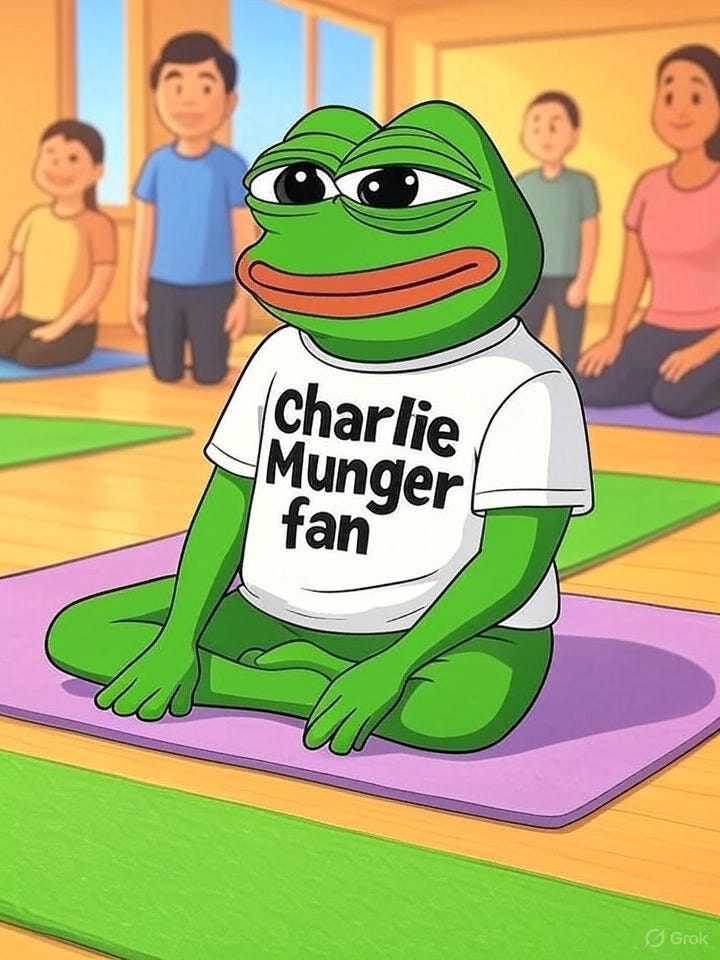What Howard Marks Taught Me Over a Bowl of Carbonara
To celebrate my dads new job we went out to an Italian restaurant to eat. While I was slurping down my carbonara I saw a bloke a couple tables away that reminded me of Howard Marks. It's interesting how the mind works. Here I am slurping carbonara down like Tony Soprano and I'm being reminded about everything Howard Marks has taught me. For those who don’t know who Howard Marks is ill catch you up. Howard Marks is an American investor, writer, and co founder of Oaktree Capital Management, a leading global investment firm with $203 bn under management. If you’re interested in learning more he has written a fantastic book called ‘’The Most Important Thing: Uncommon Sense for the Thoughtful Investor’’. In the book and his letters he writes about ‘‘how to gain an edge’’ for the layman a ‘‘edge’’ is the competitive advantage that allows an investor to outperform others.
In a nutshell Marks writes about 3 types of edges an investor can have.
Better Information
Better Analysis
Better Psychology
In today's post I want to write about these 3 and how they relate to us in 2025.
Better Information
The first edge, better information comes from investors gaining access to more accurate or insightful data about a company than the broader market. Today most of that edge has disappeared. Today you can get a monthly Koyfin subscription for the same as a decent McDonald's meal and get the same news feeds and company financials as somebody on a Bloomberg Terminal. I think this concept is more relevant for the investor of yesteryear. No longer you have to send a physical mail to a company for its annual report or have to flip through tens of thousands of pages in the Moodys manual like what Buffett did in his early days. However I do think this edge still does apply to the ‘‘little’’ things. For instance, every investor (and even A.I) can read an annual report. However today, I think the real intonation edge comes from knowing the little weird things about a company. For instance knowing that Louis Vuttion sent the cast of Jersey shore Gucci products to try and make Gucci products look cheap and tacky. That type of information won’t show up in a 10-K or a 10-Q but really shows the genius (and humour) Louis Vuttion has. Although that's a rumor, it does sound possible.
If you can gain 3-5 or more little insights like that about a company you have an edge over the average person who reads their annual reports. Here’s another fact. After World War 2, Soviet Marshal Georgy Zhukov developed a taste for Coca Cola but feared backlash from Stalin, who viewed it as a symbol of American capitalism. To avoid suspicion, the U.S. arranged for Coca Cola to be bottled in clear form and packaged with a white cap and no label making it look like vodka. That really shows how great of a product Coca Cola is. Georgy Zhukov was willing to risk his life and the life of his family to drink the sweet nectar of Coca Cola.
Better Analysis
The second edge comes interpreting the same data more insightfully than others. On a surface level this edge in recent times has faded away. For instance A.I can do the work of a junior analyst faster than them. For instance you can upload an annual report into Chat GPT and ask it questions. However this only works for the surface level for now. Everyday because of A.I the gap closes between this being an edge. However for now there's a couple parts of the investment process A.I struggles with. For instance, management quality, culture of the business, long term competitive advantages and regulatory issues, These are factors that investors must judge and not compute. For instance AI can tell you Tesla’s margins, but not how Elon Musk’s behavior might impact investor sentiment or regulation. I think if you combine AI-powered data with human powered insight, you can stay ahead. Think of AI as your tool, not your competitor or replacement.
Furthermore A.I at the moment doesn’t do well in creative and cross disciplinary thinking. Better analysis in investing goes far beyond balance sheets and earnings models it requires a multidisciplinary mindset. Great investors like Charlie Munger understand that the market is ultimately a reflection of human behavior. By drawing from fields like sociology, behavioral psychology, and history, investors can make sense of how narratives form, how crowds overreact, and how cycles repeat. Understanding fear, greed, and social contagion. While artificial intelligence can process vast amounts of data at lightning speed, it struggles with nuance, ambiguity, and long term context. It cannot yet interpret trustworthiness, leadership quality, or the second and third order effects of a new regulation or business allocation decision. This is where human judgment matters.
Better Psychology
The third edge is having the right psychology. This is about staying rational when others are emotional and having the temperament to be contrarian and patient, buying when others are fearful and selling when others are greedy. Personally this is what I consider my edge in investing. This type of edge is my favorite because A.I can’t replace this edge and you can be better than someone even though they may have +30 IQ points on you because you maintain a stable temperament. I actually believe because of A.I the market will become more efficient however I think because of Gen Z psychology it will become less efficient. Will it balance each other out ? I have no idea but what I know is there's a large chance that when Gen Z enters the work force markets will become less efficient.
Let me explain. As a 20 year old student I see how Gen Z behaves. By design Gen Z is an impatient generation. For instance because social media Gen Z has become used to instant gratification. That is the opposite of what you need to become a great investor. You want to be used to and preferably have some type of gene that caters towards delayed gratification. Furthermore, in recent times I have seen my peers start gambling not only on online crypto casinos such as Stake but also buying into bubbles such as Bitcoin. It is extremely normalised online gambling in Gen Z. All the time I overhear other students talking about their gambling habits. This is also encouraged online, it's all over social media. Tiktok, instagram for example. I see Gen Z from all parts of the world gambling for ‘‘fun’’. Furthermore, even the finance students I talk to all look up to the wrong people. For instance I have had conversations with people and they genuinely look up to Jordan Belford from the movie Wolf Of Wall Street. I can’t think of anybody in the finance space worse to look up to except for Bernie Madoff. To me looking up to Jordan Belfrod is the same as looking up to Judas. The idea you want to look up to someone who is a degenerate criminal is pure madness.
‘‘The stock market is a device for transferring money from the impatient to the patient.’’ - Warren Buffett
"The big money is not in the buying and the selling but in the waiting" - Charlie Munger
Shifting away from Gen Z, one of the most important things an investor can do is protect their mind and psychology. Emotional clarity is crucial. Never make an investment decision when you're sad, angry, or exhausted. Every investor should find a physical outlet to help regulate emotions and maintain discipline. Whether it’s boxing, yoga, swimming, lifting weights, playing basketball, or kicking a soccer ball, having some form of sport or exercise in your routine can help keep emotional decision making at bay. Personality what i do is lift weights and go to church. It doesn't have to be physical. It could be playing a board game such as chess or bridge.
Staying patient is the most important part of investing psychology. You don’t want to make a decision just because you have the cash laying around. Most of the time it's better to just sit on your hands. In my opinion if you can find a handful of wonderful businesses and buy them at fair prices you can just sit on your ass and watch them compound. To avoid being swept up in that chaos, you don’t need to be the smartest person in the room. You just need to be the most grounded. Protect your psychology like it’s your portfolio. Exercise. Go to church. Play chess. Lift weights. Stay boring and patient. Because in a world of speed and stimulation, the real edge is slowness, stillness, and sense making. Howard Marks taught us that an edge is essential. But maybe in 2025, the edge isn’t just having better analysis or information it’s having a better mind.







